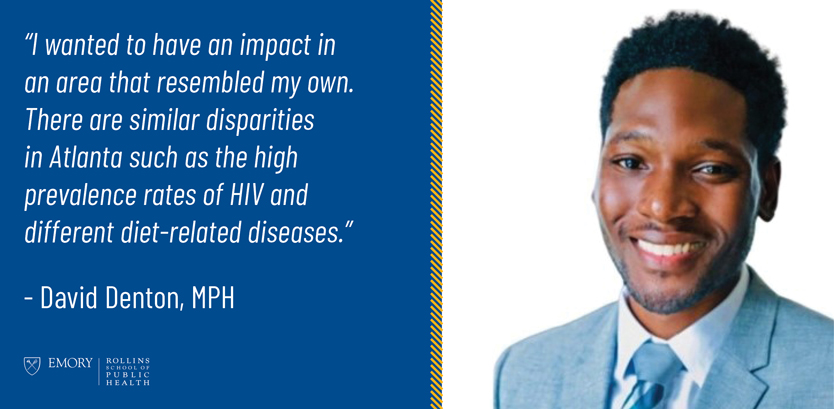Student Profile: David Denton

By Karina Antenucci
David Denton graduated from his undergraduate studies at Virginia State University in 2011 and was on the pathway to pursue a medical degree after his mother was diagnosed with diabetes. As he worked abroad and saw others inflicted with chronic diseases (like diabetes), his interest in population health grew, eventually leading him to apply to graduate programs in public health.
He was drawn to Rollins for several reasons, one of them being the accessibility and openness of its faculty and staff. “I was able to walk up to professors, even the dean, and they were willing to have rich conversations about an array of issues,” says Denton, who is a 2021 MPH graduate from the Hubert Department of Global Health. Another reason for his choice was that Atlanta resembled his hometown of the Bronx in many ways. “I wanted to have an impact in an area that resembled my own. There are similar disparities in Atlanta such as the high prevalence rates of HIV and different diet-related diseases.”
Denton, who was a Peace Corps volunteer in Fiji from 2016-2018, received the Coverdell fellowship to attend Rollins. This merit scholarship is awarded to return Peace Corps volunteers who have been identified as having leadership potential.
“David is highly involved in the university and in the community,” says Joanne Williams, associate director for student engagement. “He is seen not only as an awesome example of a student leader but is a person students go to as a trusted confidante. He is also extremely professional and is kind to everyone he meets.”
Denton took several of the principles he learned working as a Peace Corps volunteer—where he worked on a survey in collaboration with Fiji’s Ministry of Health and the Ministry of Youth and Sports—and applied it to his extensive community work in Clarkston, Georgia, through New American Pathways, an Atlanta-based nonprofit with the mission of helping refugees and Georgia thrive.
His weekly work in Clarkston is focused on helping integrate middle school refugee kids including participating in programming that helps with learning English, homework, tutoring, and after school activities such as arts and sports. “It’s been a fruitful, rich, and beautiful experience,” he says. “The kids I work with are from all over the planet.”
In addition to his own work, Denton has helped other Rollins students get volunteer opportunities working with refugee communities in Clarkston, known as the, “most diverse square mile in America.” Denton notes, “I’m trying to create the capacity for other Rollins students to volunteer to create more collaboration with the Clarkston community.”
Through the Rollins Earn and Learn (REAL) program, Denton also worked for The International Association for National Public Health Institutes in his first year at Rollins and the CDC in their emergency response and recovery branch in his second.
“The REAL program is another reason I came to Rollins,” he says. “I really love this place because it allows us to have applied experiences. I’m applying skills I learned in class in real time. I found recently that sometimes I’m even doing something in REAL that’s ahead of what I’m doing in class.”
Denton’s research interests lie at the intersection of food insecurity and diet-related chronic diseases, and how to build interventions in the most effective ways. For his thesis, he interviewed participants of Wholesome Wave’s Fruit and Vegetable Prescription Program and Open Hand Atlanta, and then used art-based methodologies to convey his research findings alongside the written thesis. His paintings, produced with a talent that was fostered at The Beacon School in Manhattan, featured poignant quotes from the interviews and depicted areas of Atlanta with food insecurities in order to visualize where these people live. The work is part of an art exhibition at Rollins, and he looks forward to continuing to incorporate the two disciplines.
While his immediate plans following graduation are still up in the air, Denton’s long-term goals are not. “I want to improve public health messaging and the distribution of resources in communities that look like mine [in the Bronx]. I’d like to include the voices of the most marginalized people in the interventions themselves, a truly participatory approach to have the people being affected be the decision-makers.”


